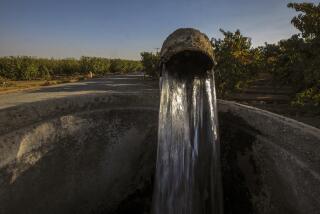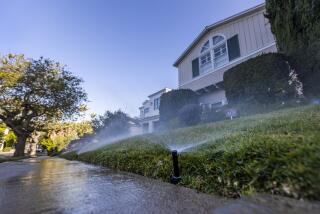Don’t Leave It With the Experts : Water Watch: How California Made the Drought Worse
- Share via
Californians are learning to live with less water. Political leaders are making headway in trying to provide more.
In March, customers of the Los Angeles Department of Water and Power, for example, used 22.8% less water than the department expected, perhaps not surprising in a month so wet that floods were common. But in April, the record was even better, with consumption 27.8% percent below anticipation.
But a recent penetrating analysis of state water operations in the 1980s by Times writer Virginia Ellis suggests that the public needs to be more involved or at least kept better informed of water policy. This is something that Gov. Pete Wilson and the California Legislature can do without expanding government, and should do without delay.
The drought that has jolted California from its extended stupor on the topic of water began in 1987. During the next four years, all but one of them critically dry, the state shipped more water to cities and farms than in any other four years in its history.
As Ellis made clear in her analysis of how the state chose that pattern, there was nothing reckless about the decisions. But an awareness that the state must mend its ways on water poses a challenge to elements of the decisions.
First, the state went right on emptying reservoirs in the fourth year of drought without any fallback plan in case the odds against a fifth dry year in a row proved wrong.
Beyond that, the decisions were made without much outside consultation and with no warning at all to millions of Californians affected by them.
The first flaw in the process is being corrected. Sacramento now is buying, storing and selling water through a state water bank that could have, and should have, been set up years ago. Bills are moving in Congress to change operations of the state’s biggest water system, the federal Central Valley Project. The one with the broadest potential impact, sponsored by Sen. Bill Bradley (D-N.J.), will require the federal system to follow California law on water rights and environmental protection.
The basic secrecy in which water decisions are made must be changed, even though the decisions are made by managers who think they know what’s best for California. They may be right--mostly.
What the state needs is a group of people more interested in using water than in delivering it--businessmen, urban customers, environmentalists, farmers and the public generally--to monitor state water operations. Its most important role could be to ask obvious questions. One last year might have been: Why are you draining reservoirs during a drought?
Keeping the public posted need not be difficult. A Water Commission already exists, dominated by water experts. New guidelines for membership could produce a mix more representative of California.
More to Read
Sign up for Essential California
The most important California stories and recommendations in your inbox every morning.
You may occasionally receive promotional content from the Los Angeles Times.













